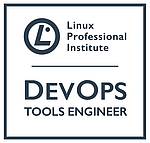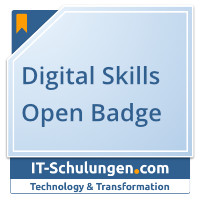
LPIC-OT DevOps Tools Engineer Part II
Ziele
In dieser 4-tägigen Schulung "LPIC-OT DevOps Tools Engineer Part II" vertiefen Sie Ihre Fähigkeiten und Kenntnisse im Bereich DevOps. Unternehmen weltweit setzen verstärkt auf DevOps-Praktiken, um die täglichen Aufgaben in Systemadministration und Softwareentwicklung zu optimieren. Dies führt dazu, dass branchenübergreifend IT-Experten gesucht werden, die DevOps effektiv einsetzen können, um Lieferzeiten zu verkürzen und die Qualität neuer Softwareprodukte zu steigern.
Die LPIC-Open Technology DevOps Tools Engineer-Zertifizierung wurde entwickelt, um Ihre Fähigkeiten im Umgang mit Tools zur Verbesserung der Zusammenarbeit in Systemverwaltung und Softwareentwicklung zu verifizieren. Die Schulung konzentriert sich auf praktische Fertigkeiten, die in einer DevOps-Umgebung erfolgreich eingesetzt werden können. Dabei liegt der Schwerpunkt auf der Nutzung bekannter DevOps-Tools. Diese Zertifizierung deckt den Schnittpunkt von Entwicklung und Betrieb ab und ist relevant für alle IT-Experten, die im Bereich DevOps arbeiten.
Die Schulung vermittelt Kenntnisse in den Bereichen Maschinen-Bereitstellung, Konfigurationsmanagement und Service-Operations.
Nach Abschluss dieser Schulung sind Sie besser darauf vorbereitet, DevOps-Praktiken in Ihrer Arbeit anzuwenden und sich weiterhin in der LPIC-OT DevOps Tools Engineer-Zertifizierung zu entwickeln.
Dieser Kurs ist nur als LPIC-OT DevOps Tools Engineer Komplettkurs buchbar.
Zielgruppe
- Entwickler
- Softwarearchitekten
Voraussetzungen
- Absolvierung des Kurses LPIC-OT DevOps Tools Engineer Part I
Lernmethodik
Die Schulung bietet Ihnen eine ausgewogene Mischung aus Theorie und Praxis in einer erstklassigen Lernumgebung. Profitieren Sie vom direkten Austausch mit unseren projekterfahrenen Trainern und anderen Teilnehmern, um Ihren Lernerfolg zu maximieren.
Agenda
703.1 Virtual Machine Deployment (weight: 4)
Key Knowledge Areas:
- Understand Vagrant architecture and concepts, including storage and networking
- Retrieve and use boxes from Atlas
- Create and run Vagrantfiles
- Access Vagrant virtual machines
- Share and synchronize folder between a Vagrant virtual machine and the host system
- Understand Vagrant provisioning, including File, Shell, Ansible and Docker
- Understand multi-machine setup
The following is a partial list of the used files, terms and utilities:
- vagrant
- Vagrantfile
703.2 Cloud Deployment (weight: 2)
Key Knowledge Areas:
- Understanding the features and concepts of cloud-init, including user-data and initializing and configuring cloud-init
- Use cloud-init to create, resize and mount file systems, configure user accounts, including login credentials such as SSH keys and install software packages from the distribution’s repository
- Understand the features and implications of IaaS clouds and virtualization for a computing instance, such as snapshotting, pausing, cloning and resource limits.
703.3 System Image Creation (weight: 2)
Key Knowledge Areas:
- Understand the functionality and features of Packer
- Create and maintain template files
- Build images from template files using different builders
The following is a partial list of the used files, terms and utilities:
- packer
704: Configuration Management
704.1 Ansible (weight: 8)
Key Knowledge Areas:
- Understand the principles of automated system configuration and software installation
- Create and maintain inventory files
- Understand how Ansible interacts with remote systems
- Manage SSH login credentials for Ansible, including using unprivileged login accounts
- Create, maintain and run Ansible playbooks, including tasks, handlers, conditionals, loops and registers
- Set and use variables
- Maintain secrets using Ansible vaults
- Write Jinja2 templates, including using common filters, loops and conditionals
- Understand and use Ansible roles and install Ansible roles from Ansible Galaxy
- Understand and use important Ansible tasks, including file, copy, template, ini_file, lineinfile, patch, replace, user, group, command, shell, service, systemd, cron, apt, debconf, yum, git, and debug
- Awareness of dynamic inventory
- Awareness of Ansibles features for non-Linux systems
- Awareness of Ansible containers
The following is a partial list of the used files, terms and utilities:
- ansible.cfg
- ansible-playbook
- ansible-vault
- ansible-galaxy
- ansible-doc
704.2 Other Configuration Management Tools (weight: 2)
Key Knowledge Areas:
- Basic feature and architecture knowledge of Puppet.
- Basic feature and architecture knowledge of Chef.
The following is a partial list of the used files, terms and utilities:
- Manifest, Class, Recipe, Cookbook
- puppet
- chef
- chef-solo
- chef-client
- chef-server-ctl
- knife
Topic 705: Service Operations
705.1 IT Operations and Monitoring (weight: 4)
Key Knowledge Areas:
- Understand goals of IT operations and service provisioning, including nonfunctional properties such as availability, latency, responsiveness
- Understand and identify metrics and indicators to monitor and measure the technical functionality of a service
- Understand and identify metrics and indicators to monitor and measure the logical functionality of a service
- Understand the architecture of Prometheus, including Exporters, Pushgateway, Alertmanager and Grafana
- Monitor containers and microservices using Prometheus
- Understand the principles of IT attacks against IT infrastructure
- Understand the principles of the most important ways to protect IT infrastructure
- Understand core IT infrastructure components and their the role in deployment
The following is a partial list of the used files, terms and utilities:
- Prometheus, Node exporter, Pushgateway, Altermanager, Grafana
- Service exploits, brute force attacks, and denial of service attacks
- Security updates, packet filtering and application gateways
- Virtualization hosts, DNS and load balancers
705.2 Log Management and Analysis (weight: 4)
Key Knowledge Areas:
- Understand how application and system logging works
- Understand the architecture and functionality of Logstash, including the lifecycle of a log message and Logstash plugins
- Understand the architecture and functionality of Elasticsearch and Kibana in the context of log data management (Elastic Stack)
- Configure Logstash to collect, normalize, transform and store log data
- Configure syslog and Filebeat to send log data to Logstash
- Configure Logstash to send email alerts
- Understand application support for log management
The following is a partial list of the used files, terms and utilities:
- logstash
- input, filter, output
- grok filter
- Log files, metrics
- syslog.conf
- /etc/logstash/logstash.yml
- /etc/filebeat/filebeat.yml
Hinweise
Prüfung und Zertifizierung
- Aktuelle Version: 1.0 (Prüfungscode 701-100)
- Ziele: 701-100
- Anforderungen : Bestehen Sie die DevOps Tools Engineer-Prüfung des Linux Professional Institute. Die 90-minütige Prüfung besteht aus 60 Multiple-Choice- und Lückentextfragen.
- Gültigkeitsdauer: 5 Jahre
- Prüfungsgebühren: Zzgl. 160 Euro, zzgl MwSt
- Sprachen : Englisch
Open Badge - Ihr digitaler Kompetenznachweis

Durch die erfolgreiche Teilnahme an einem Kurs bei IT-Schulungen.com erlangen Sie nicht nur Fachkenntnisse und Fähigkeiten, sondern bekommen zusätzlich zu Ihrem Teilnahmezertifikat ein Open Badge als digitalen Nachweis Ihrer Kompetenz.
Sie können diesen in Ihrem persönlichen und kostenfreien Mein IT-Schulungen.com Konto abrufen. Ihre verdienten Badges lassen sich problemlos in sozialen Netzwerken integrieren und weitergeben.
Kurz vor Durchführung
| Termin | Standort | Aktion |
|---|---|---|
| 13.08. - 16.08.2024 | Hamburg | |
| 02.09. - 05.09.2024 | München | |
| 15.10. - 18.10.2024 | Köln | |
| 11.11. - 14.11.2024 | Nürnberg |







 Sie haben in Ihrem Browser Javascript deaktiviert! Bitte aktivieren Sie Javascript um eine korrekte Darstellung und Funktionsweise von IT-Schulungen zu gewährleisten.
Sie haben in Ihrem Browser Javascript deaktiviert! Bitte aktivieren Sie Javascript um eine korrekte Darstellung und Funktionsweise von IT-Schulungen zu gewährleisten.